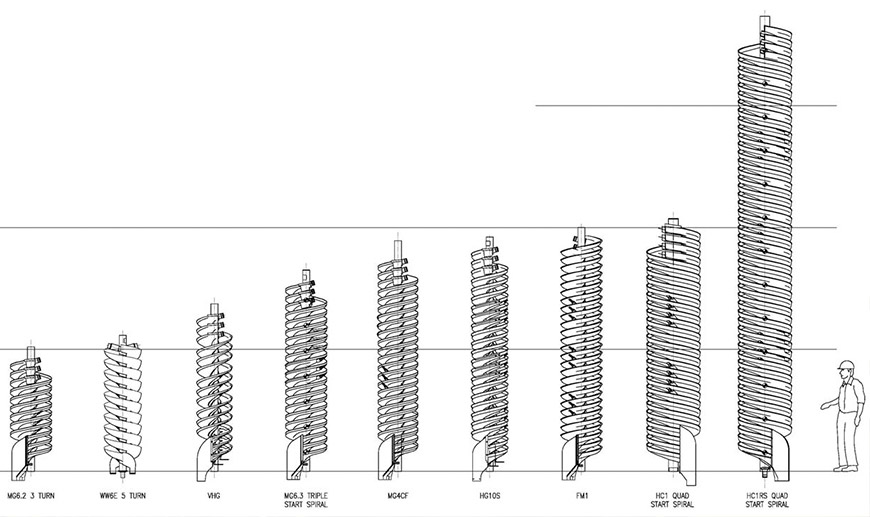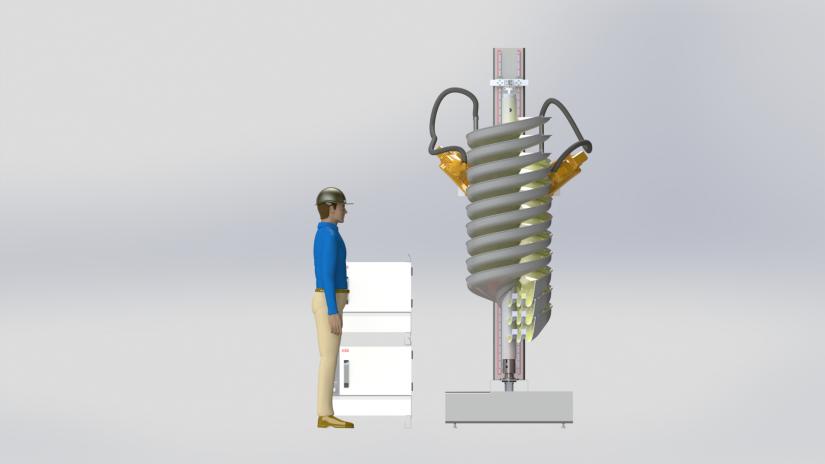The University of Technology Sydney (UTS) has provided an update on its R&D collaboration with Mineral Technologies, the mining subsidiary of Australian integrated services company Downer Group, and the Innovative Manufacturing CRC (IMCRC). The project, which aims to create a bespoke 3D printer for producing mineral separation and mining equipment, to be used by Mineral Technologies, has now reached its one-year milestone.
Since the project began in 2018, Alex de Andrade, Associate Professor with UTS and Mineral Technologies Global Manager, Sales, Equipment, and Technology, states that the research team have achieved the necessary green lights for building the prototype 3D printer, “In the first year, we designed a small printer and machinery code as well as printed a scaled version of our selected spiral model.”
“We are now into the cost and wear testing comparisons and in parallel we are building the full-scale bespoke prototype printer”

Commercial and environmental benefits of 3D printed mineral spirals
The alliance between the three entities was formed with the goal of allowing Mineral Technologies to manufacture bespoke mineral separation spiral models that are sent directly to a 3D printer. These spirals are used to separate valuable minerals from mined material across mining, farming, and recycling operations. By 3D printing the spirals, Mineral Technologies will be able to manufacture them on-site, in real-time, allowing the company to cut costs and save time.
Other potential benefits of the research project include a positive environmental impact, as using 3D printing will lessen the use of chemicals and reduce air contamination in the manufacturing process. Furthermore, the project has also lead to a Ph.D. study program established at UTS and has won a 2019 NSW iAwards for its rotational 3D printing system.
Additionally, the research team has also identified a route for further development scope regarding Internet of Things (IoT) connectivity, which will allow the project to reach its Industry 4.0 milestone outcomes. The funding will be matched by the IMCRC, with one patent reportedly pending for the IoT technology developed under the project. David Chuter, CEO and Managing Director of IMCRC, states:
“This exceptional project takes industry-led research collaboration to the next level. Within a year we have seen Mineral Technologies and UTS form a team that ‘collaborates to innovate’ and deliver on milestones. Seeing a 3D printed version of their selected spiral model puts it into perspective.”
Alongside the research project with UTS and Mineral Technologies, the IMCRC has also invested $994k (USD) into the development of an automated 3D printed car repair service at Swinburne University of Technology.

Innovating advanced manufacturing in Australia
The UTS Rapido rapid prototyping unit, established in 2016, is working on the research project with Mineral Technologies and IMCRC. UTS Rapido gives industry, government and community partners the opportunity to turn their ideas into viable products and solutions. The collaborative project is taking place in its ProtoSpace additive manufacturing facility.
The ProtoSpace facility was opened by UTS in March 2019 and is geared towards growing advanced manufacturing in Australia. It provides an ‘open space’ for businesses of all sizes to use 3D printing technology and is equipped with advanced 3D printing systems, including the Nano Dimension Dragonfly 3D printer.
Recently, the ProtoSpace facility was also used to create a personalized fingerprint stool, using a BigRep ONE 3D printer located at the lab. The stool was produced to demonstrate the capabilities of the 3D printing technology available at UTS in its ProtoSpace lab.
Hervé Harvard, Director at UTS Rapido and ProtoSpace, comments on the alliance with Mineral Technologies and IMCRC: “The project is a world-class innovation in the area of Industry 4.0, particularly Additive Manufacturing and IoT sensing, specific to what the project has achieved. Working with such an innovative team at Mineral Technologies is refreshing and shows that Australia can be a leader in adopting Industry 4.0 principles for global impact.”
Subscribe to the 3D Printing Industry newsletter for the latest news in additive manufacturing. You can also keep connected by following us on Twitter and liking us on Facebook.
Looking for a career in additive manufacturing? Visit 3D Printing Jobs for a selection of roles in the industry.
Featured image shows the UTS Building 11, exterior by night from Central Park. Photo by Andrew Worssam.


